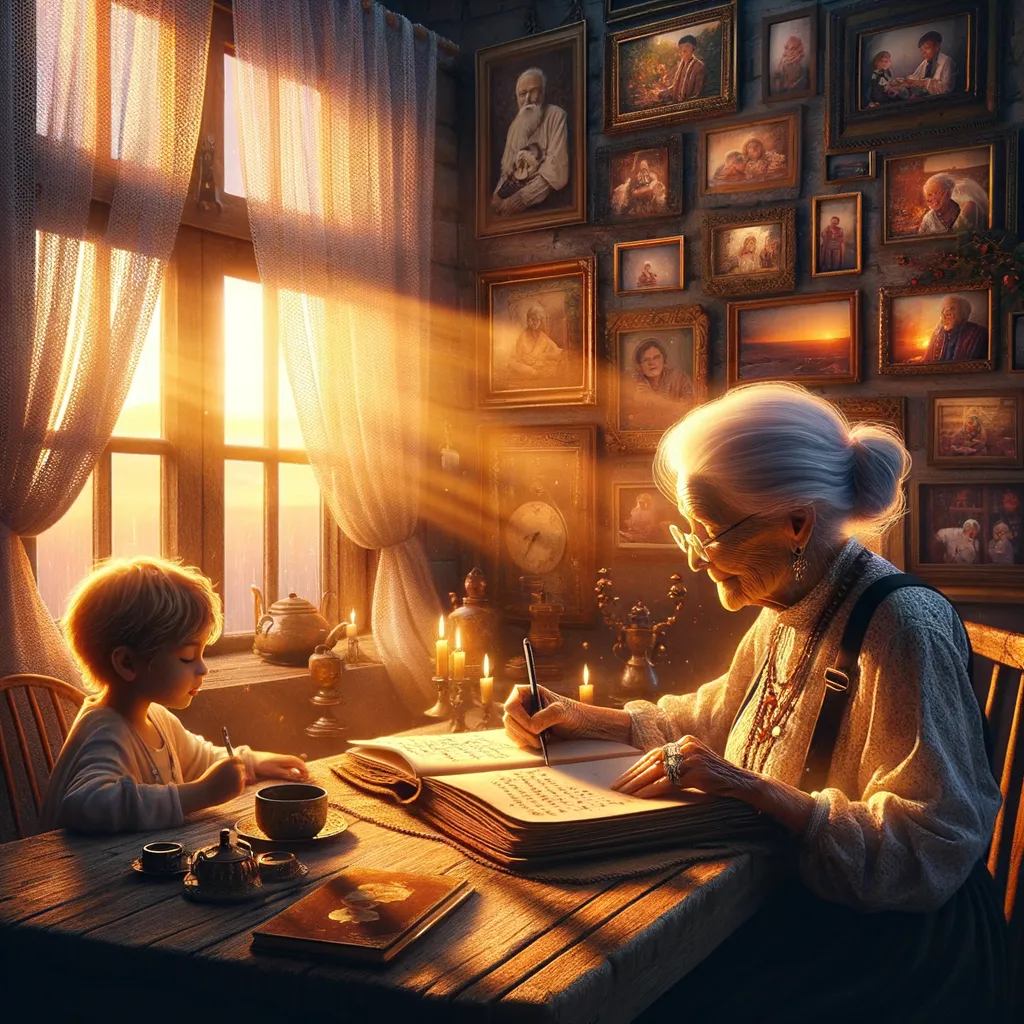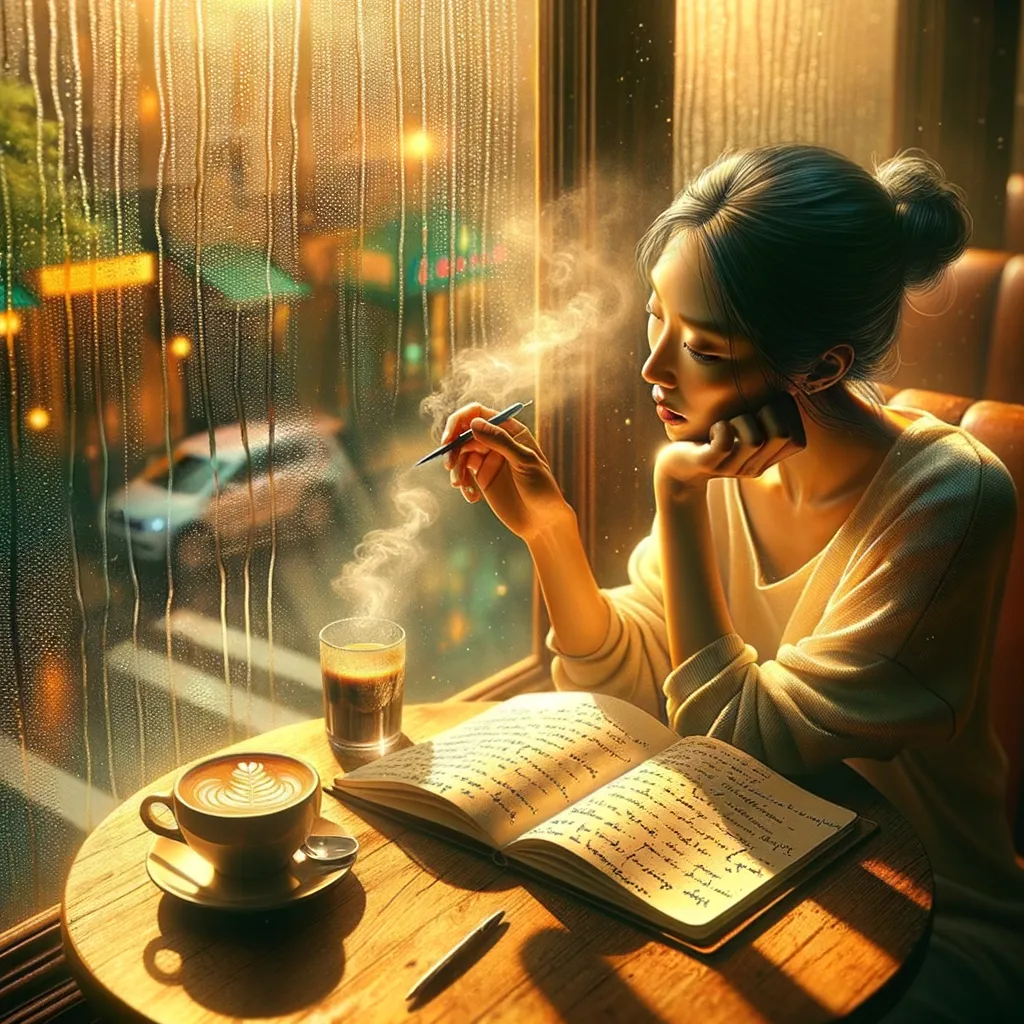Unveiling Hidden Legacies: A Journey Through Words
In a world where memories intertwine like threads in a tapestry, a family gathers around an old wooden table, where laughter and stories breathe life into their shared history. As the sun sets, a young observer watches their grandmother, her weathered hands gracefully capturing moments in a leather-bound journal, each entry a portal to triumphs and heartaches that bind generations. This sacred act of writing ignites a spark within the observer, who begins to pen their own journey, discovering that every word is a stepping stone in the labyrinth of self-discovery. Years later, the table becomes a gathering place for the next generation, where tales of resilience inspire young hearts to carve their own narratives, intertwining their lives through the magic of words. As the cycle continues, a question lingers in the air: will these stories illuminate the path for the future, or fade into echoes of the past, challenging us to ponder the meaning behind the legacies we choose to create?
In the memory of February 17, 2002, I find myself wandering through the threads of a time long past, a tapestry woven with the moments that shaped my family’s journey. The air was thick with nostalgia, a soft blanket of winter chill mingling with the warmth of shared laughter and stories. That day, our family gathered around an old wooden table, its surface scratched and stained, each mark a testament to the countless meals and conversations it had witnessed. It was here that I first realized the power of words, the way they could bridge generations and bind hearts.
As the sun dipped below the horizon, casting an amber glow through the frosted windows, I observed my grandmother’s hands, weathered yet graceful, as she penned her thoughts in a leather-bound journal. It was more than a book; it was a vessel of memories, capturing the essence of her life and the lives of those before her. Each entry was a layer of her soul, a glimpse into her dreams, fears, and reflections. I marveled at how a simple act of writing could transform fleeting moments into lasting legacies, whispering secrets to those who would come after.
In those pages, I discovered a world filled with triumphs and tragedies, love letters to lost friends, and confessions of heartache. My grandmother wrote of her childhood, where laughter echoed through sun-drenched fields and shadows danced in moonlit nights. Each story was a thread woven into the fabric of our family, binding us not only to her past but to each other. I began to understand that this journal was not merely a collection of words; it was a lifeline, connecting us to our roots, our history, and our shared humanity.
As I grew older, I felt an irresistible pull to create my own narrative. I started a journal, mimicking the strokes of my grandmother’s pen, pouring my thoughts onto the pages with youthful fervor. I wrote about the mundane and the extraordinary, the heartaches of first love and the exhilaration of new beginnings. Each word was a stepping stone in my own journey, leading me deeper into the labyrinth of self-discovery. I realized that journaling was not just a habit; it was a rite of passage, a sacred space where my voice could echo and resonate.
The years rolled on, and that old wooden table became a gathering place for my own children, who listened wide-eyed as I recounted stories from my journal. They were captivated by the tales of resilience and hope, of laughter mingled with tears. It dawned on me that I was not just sharing my life; I was igniting a spark in them, encouraging them to carve their own paths through the landscape of words. The journals we kept became our family’s legacy, a collection of hearts intertwined through the ages.
In this cycle of writing and sharing, I began to see a central theme emerge—an exploration of identity. Each generation, armed with their own experiences, would add their unique voice to the narrative, stitching together a vibrant quilt of perspectives. The journals became a mirror reflecting our evolution, a testament to the ways we navigated love, loss, and the quest for understanding. They were more than mere records; they were an invitation to delve deeper into the complexities of being human.
One day, as I flipped through my grandmother’s old journal, I stumbled upon a passage that took my breath away. It spoke of a moment she had nearly forgotten, a fleeting encounter that had changed the course of her life. It was a reminder that the most profound discoveries often lie hidden within the mundane, waiting to be unearthed by those willing to look closely. This realization sparked a fire within me—what other revelations were waiting in the shadows of my own writing?
As time continued its relentless march, I envisioned a future where my children, and their children, would sit around that same wooden table. They would turn the pages of their journals, perhaps sharing laughter or tears, continuing the tradition that had become so integral to our family’s story. It filled me with hope to think that this ritual would persist, that each generation would carry forward the essence of who we are through the simple act of writing.
Yet, even as I pondered the future, a question lingered in the air, swirling like autumn leaves caught in a gentle breeze. Would our collective stories illuminate the path for those who come after us, or would they become mere echoes of a time long past? In this dance of discovery and surprise, I realized that the theme uniting us all was not just identity or legacy, but the eternal search for meaning in the stories we choose to tell. What stories will you leave behind, and how will they shape the lives of those who follow?
In the quiet act of writing, generations intertwine, forging legacies that illuminate the shadows of our shared humanity.



